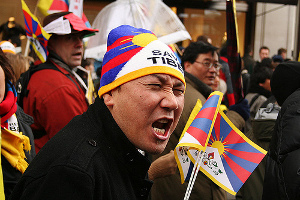 ECONOMIST– On the topic of Tibet, Xi Jinping, the man widely expected to be the
next leader of the Chinese Communist Party, sounds much like his
predecessors. Speaking on July 19th in the capital, Lhasa, in front of
the Potala Palace, former residence of the Dalai Lamas, Tibet’s
spiritual leaders, he celebrated the way Chinese rule had led Tibet “from the dark toward the light”.
ECONOMIST– On the topic of Tibet, Xi Jinping, the man widely expected to be the
next leader of the Chinese Communist Party, sounds much like his
predecessors. Speaking on July 19th in the capital, Lhasa, in front of
the Potala Palace, former residence of the Dalai Lamas, Tibet’s
spiritual leaders, he celebrated the way Chinese rule had led Tibet “from the dark toward the light”.
In material terms, he has an obvious point. Tibet is far better-off than in 1951, when a young Dalai Lama reached a “17-point agreement” ceding Chinese sovereignty over the territory. He also has a point that, before 1951, Tibet was not some idyllic Shangri-La of tinkling temple bells, lowing conch shells and smiling people, but a highly stratified society relying on mass monasticism and serfdom.
The difficulty Mr Xi and his predecessors face, however, is that large numbers of Tibetans resent Chinese rule. Many are still loyal to the Dalai Lama, who fled into exile with some 80,000 of his followers after the crushing of an anti-Chinese uprising in 1959. Since then the region has been scarred by periodic riots, including a bloody outburst of anti-Chinese violence in Lhasa in 2008.
This year has seen a confrontation at the Kirti monastery in a part of historic Tibet now incorporated in the Chinese province of Sichuan, after a young monk burnt himself to death in March. Hundreds of monks have been taken off for “patriotic education”. This year has also seen a heavy security crackdown to prevent any unrest to mark the 60th anniversary of the 17-point agreement, or the Party’s 90th birthday on July 1st.
China, in public at least, blames the Dalai Lama for the continued Tibetan disaffection. So its spokesmen fume when he is received by foreign leaders, especially America’s. On July 16th Barack Obama met the Dalai Lama in the White House. After the meeting, the White House emphasised that, besides underlining America’s support for Tibetans’ cultural identity and human rights, Mr Obama also repeated America’s acceptance of Chinese sovereignty over Tibet.
Nevertheless, the People’s Daily called the meeting “an unscrupulous trick of pragmatism” that undermined the United States’ position as a great world power. Mr Obama has partly himself to blame for the accusation of pragmatism. In 2009 he postponed a meeting with the Dalai Lama in order not to sour the atmosphere for his trip to China a few months later—in effect conceding that such meetings are not matters of pure principle.
Read more about Tibet, China, and America: Towards The Light?
© 2011 The Economist
Photo by Flickr user Tanya Nagar










